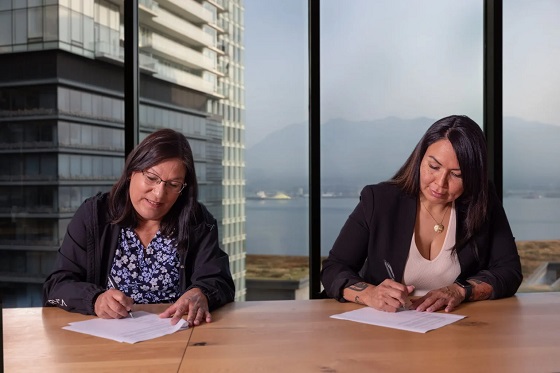Business
Essential goods shouldn’t be taxed

From the Canadian Taxpayers Federation
By Jay Goldberg
The Trudeau government’s two-month GST holiday on certain items has been called many things.
Former finance minister Chrystia Freeland resignation letter suggests she thinks it’s a “gimmick.”
Conservative Leader Pierre Poilievre has called it a “tax trick.”
But here’s a more fundamental question: If the government thinks Canadians needs a sales tax holiday on certain items, why are those basics taxed in the first place?
Items like car seats, diapers, and pre-prepared foods are all taxed by the feds. They’re all also subject to the federal government’s sales tax holiday, which Prime Minister Justin Trudeau says was triggered because Canadians are having a hard time making ends meet.
“Our government can’t set prices, but we can give Canadians, and especially working Canadians, more money back in their pocket,” said Trudeau at his GST holiday announcement.
At least Trudeau seems to know it’s bad for governments to set prices. But the government does raise prices by adding sales tax on top of goods Canadians have to buy.
And you don’t need to be a parent to know that car seats and diapers are among the most essential goods on a parent’s shopping list.
Take a car seat. A mid-tier car seat costs around $250. The federal sales tax, which is currently at five per cent, adds $12.50 to the final cost of that car seat.
Parents across the country are no doubt asking why things like car seats and diapers were taxed by the feds in November, will be taxed again by the feds in March, but aren’t being taxed right now.
What justification can the government possibly give to parents on Feb. 16, 2025 – the day this sales tax holiday ends – for once again taxing things like car seats and diapers?
The same goes for pre-prepared meals. Many Canadians buy pre-prepared food at grocery stores to bring to work for lunch or to eat on the go. Why are the ingredients for that pre-prepared meal not taxed but the final meal is? And why take the tax off a grocery store deli sandwich now but not a few months from now?
There’s even more of an argument to be made on this front because many provinces don’t tax a lot of the items that are part of the feds’ sales tax holiday.
Take Ontario as an example.
Canada’s most populous province doesn’t tax things like books, children’s clothing, car seats, and diapers. Some pre-prepared foods aren’t taxed either.
If provinces don’t tax these items, why do the feds?
The Trudeau government took inspiration from the NDP when it comes to the GST break. It ought to also take inspiration from the party’s call to make relief permanent.
Trudeau’s GST announcement came just days after NDP Leader Jagmeet Singh called for the permanent removal of the federal sales tax on items like pre-prepared meals, diapers, and car seats. Singh’s proposal actually went much further, and included ending the GST on home heating, as well as internet and phone bills.
In touting his proposal, Singh argued that “those taxes never should have been there in the first place.”
Singh is right. Essential goods shouldn’t be subject to the GST. Period.
Just days after Singh’s announcement, Trudeau played copycat with one of his own.
But a two-month reprieve pales in comparison to permanent relief.
If the Trudeau government wants to deliver real relief to struggling Canadian families, essential items that most provinces already don’t tax, such as diapers, car seats, and pre-prepared meals, should be permanently exempt from the GST.
Permanent sales tax relief is more than doable. The feds could deliver on it without hiking the deficit by taking a sledgehammer to the more than $40 billion a year they hand out in corporate welfare.
Anything less than a permanent sales tax break simply won’t cut it when it comes to cutting costs for Canadians.
Business
Carney and other world leaders should recognize world’s dependence on fossil fuels

From the Fraser Institute
By Julio Mejía and Elmira Aliakbari
Simply put, despite trillions invested in the energy transition, the world is more dependent on fossil fuels today than when the United Nations launched its first COP. No wonder that ahead of COP30, leading voices of the net-zero-by-2050 agenda, including Bill Gates, are acknowledging both the vital role of fossil fuels on the planet and the failure of efforts to cut them.
On the heels of his first federal budget, which promises more spending to promote a “green economy,” Prime Minister Carney will soon fly to Brazil for COP30, the 30th United Nations climate summit. Like the former Trudeau government, the Carney government has pledged to achieve “net-zero” emissions in Canada—and compel other countries to pursue net-zero—by 2050. To achieve a net-zero world, it’s necessary to phase out fossil fuels—oil, natural gas, coal—or offset their CO2 emissions with technologies such as “carbon capture” or large-scale tree planting.
But after trillions of dollars spent in pursuit of that goal, it appears more unrealistic than ever. It’s time for world leaders, including Canada’s policymakers, to face reality and be honest about the costly commitments they make on behalf of their citizens.
For starters, carbon capture—the process of trapping and storing carbon dioxide so it’s unable to affect the atmosphere—is a developing technology not yet capable of large-scale deployment. And planting enough trees to offset global emissions would require vast amounts of land, take decades to absorb significant CO2 and risk unpredictable losses from wildfires and drought. Due to these constraints, in their net-zero quest governments and private investors have poured significant resources into “clean energy” such as wind and solar to replace fossil fuels.
According to the International Energy Agency (IEA), from 2015 to 2024, the world’s public and private investment in clean energy totalled and estimated US$14.6 trillion (inflation-adjusted). Yet from 1995 (the first COP year) to 2024, global fossil fuel consumption increased by more than 64 per cent. Specifically, oil consumption grew by 39 per cent, natural gas by 96 per cent and coal by 76 per cent. As of 2024, fossil fuels accounted for 80.6 per cent of global energy consumption, slightly lower than the 85.6 per cent in 1995.
The Canadian case shows an even greater mismatch between Ottawa’s COP commitments and its actual results. Despite billions spent by the federal government on the low-carbon economy (electric vehicle subsidies, tax credits to corporations, etc.), fossil fuel consumption in our country has increased by 23 per cent between 1995 and 2024. Over the same period, the share of fossil fuels in Canada’s total energy consumption climbed from 62.0 to 66.3 per cent.
Simply put, despite trillions invested in the energy transition, the world is more dependent on fossil fuels today than when the United Nations launched its first COP. No wonder that ahead of COP30, leading voices of the net-zero-by-2050 agenda, including Bill Gates, are acknowledging both the vital role of fossil fuels on the planet and the failure of efforts to cut them.
Why has this massive effort, which includes many countries and trillions of dollars, failed to transition humanity away from fossil fuels?
As renowned scholar Vaclav Smil explains, it can take centuries—not decades—for an energy source to become globally predominant. For thousands of years, humanity relied on wood, charcoal, dried dung and other traditional biomass fuels for heating and cooking, with coal only becoming a major energy source around 1900. It took oil 150 years after its introduction into energy markets to account for one-quarter of global fossil fuel consumption, a milestone reached only in the 1950s. And for natural gas, it took about 130 years after its commercial development to reach 25 per cent of global fossil fuel consumption at the end of the 20th century.
Yet, coal, oil and natural gas didn’t completely replace traditional biomass to meet the surging energy demand as the modern world developed. As of 2020, nearly three billion people in developing countries still relied on charcoal, straw and dried dung to supply their basic energy needs. In light of these facts, the most vocal proponents of the global energy transition seem, at the very least, out of touch.
The world’s continued reliance on fossil fuels should prompt world leaders at COP30 to exercise caution before pushing the same unrealistic commitments of the past. And Prime Minister Carney, in particular, should be careful not to keep leading Canadians into costly ventures that lead nowhere near their intended results.
Business
Liberals refuse to disclose the amount of taxpayer dollars headed to LGBT projects in foreign countries

From LifeSiteNews
The Liberal government of Prime Minister Mark Carney will not openly disclose how much money from its foreign-aid budget is going toward overseas “gender identity” and “decolonization” projects.
According to the government, there are “concerns” that disclosing the amount of funds could endanger certain LGBT organizations that get money from it.
On November 3, Global Affairs Canada, in response to a question on the order paper from a Conservative MP, said that the funding amounts could not be made public due to claimed “security concerns” and “confidentiality requirements.”
“These are the most common reasons projects are considered sensitive: the organization or individuals might be in danger if it becomes known that they are receiving funds from a foreign government; (or) implementing a project related to sensitive topics such as two-spirit, lesbian, gay, bisexual, transgender, queer, intersex and additional sexually and gender-diverse people rights, human trafficking, early/forced marriage, (and) human rights defenders,” Global Affairs noted.
Continuing, Global Affairs said that there is a possible “danger” to partner organizations that could be “forced to close” or even “arrested” due to “harassment from the local population or government.”
As reported by LifeSiteNews, Carney’s budget will include millions in taxpayer money for “SLGBTQI+ communities,” gender equality, and “pride” safety.
Canada’s 2025 federal budget is allotting some $54.6 million to LGBT groups in a move criticized by Campaign Life Coalition as prioritizing activist agendas over struggling families’ basic needs.
Canadian taxpayers are already dealing with high inflation and high taxes due in part to the Liberal government overspending and excessive money printing, and even admitting that giving money to Ukraine comes at the “taxpayers’” expense.
As recently reported by LifeSiteNews, Bank of Canada Governor Tiff Macklem gave a grim assessment of the state of the economy, essentially telling Canadians that they should accept a “lower” standard of living.
-

 Agriculture2 days ago
Agriculture2 days agoBovaer Backlash Update: Danish Farmers Get Green Light to Opt Out as UK Arla Trial Abruptly Ends!
-

 Business2 days ago
Business2 days agoCarney’s Floor-Crossing Campaign. A Media-Staged Bid for Majority Rule That Erodes Democracy While Beijing Hovers
-

 espionage22 hours ago
espionage22 hours agoChinese-Owned Trailer Park Beside U.S. Stealth Bomber Base Linked to Alleged Vancouver Repression Case
-

 Alberta1 day ago
Alberta1 day agoSchool defunding petition in Alberta is a warning to parents
-

 Daily Caller22 hours ago
Daily Caller22 hours agoLaura Ingraham Presses Trump On Allowing Flood Of Chinese Students Into US
-

 Business1 day ago
Business1 day agoLiberals refuse to disclose the amount of taxpayer dollars headed to LGBT projects in foreign countries
-

 armed forces2 days ago
armed forces2 days agoIt’s time for Canada to remember, the heroes of Kapyong
-

 Digital ID1 day ago
Digital ID1 day agoCanada moves forward with digital identification for federal benefits seekers




